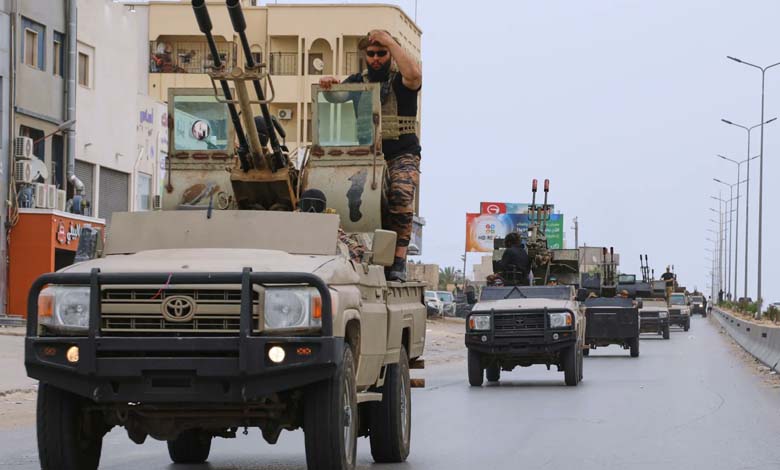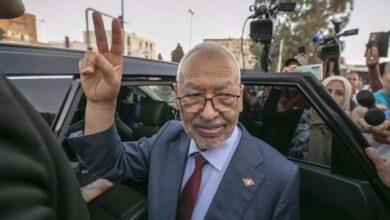The Smoke of Tripoli Clashes Still Rises: Political Economic and Security Repercussions

Libya is undergoing a critical phase marked by instability and lack of national consensus, amid a reality shaped by deep political divisions and armed conflicts that have strengthened the influence of militias within the capital, Tripoli, with serious implications for security and the economy.
-
Gheniwa’s Blood Strangles Dbeibah… Tripoli’s Nero Burns in His Own Fire
-
Protests in Tripoli Call for Dbeibah and His Government to Step Down
The current crisis reflects not just a structural flaw in the state’s foundation, but also poses a real threat to the political transition process. Despite a succession of local and international initiatives, a solution remains dependent on genuine willingness to unify the executive authority and disarm militias, paving the way for elections and comprehensive reconciliation.
A “Deep-Rooted” Political Crisis
Salah Boukhezem Al-Hasnaoui, a member of Libya’s constitutional drafting committee, affirms that the political crisis is deeply entrenched. He highlights the proliferation of governments and authorities, along with conflicting legal frameworks, which has led to institutional confusion and overlapping mandates.
-
Militia Arms Chaos Reignites Violence Spiral in Tripoli
-
Heavy Clashes in Tripoli After the Killing of a Militia Leader Affiliated with the Presidential Council
Al-Hasnaoui noted that this chaotic reality was clearly reflected in three decrees issued by Presidential Council head Mohamed Al-Menfi, labeled as “legal decrees.” These were seen as overstepping the boundaries of other authorities in the absence of a unified power regulating state institutions.
The recurring clashes between militias in Tripoli reveal the extent of foreign interference and conflicting regional and international interests, as well as the failure to resolve the political track and clearly define powers, according to the Libyan analyst.
-
Armed Clashes in Tripoli Reveal Fragility of Security Situation
-
Washington Denies Training Armed Groups in Tripoli under Agreement with Dbeibeh
Impending Security Explosion?
Military expert Mohamed Al-Tarhouni believes the situation in Tripoli remains fragile and dangerous due to ongoing mobilizations of armed factions, despite a recent and fragile ceasefire reached with no real guarantees of sustainability.
He said that dismantling and disarming militias is a fundamental challenge to any political settlement. These armed groups continue to impose coercive power, preventing elections, silencing dissent, and committing serious violations, including assassinations of key figures such as Abdelrahman Milad (Al-Bidja) and Abdelghani Al-Kikli (Gheniwa).
-
Clashes Between Militias in Tripoli Mar Eid Atmosphere
-
Complications Hindering the Evacuation of Militias from Tripoli
Al-Tarhouni warned that these militias, with their divided loyalties, are capable of igniting conflict at any moment, especially if they feel excluded from the political scene—making the unification of executive power extremely difficult.
Economy in the Line of Fire
Economically, financial expert Haitham Bou Bakr Al-Obaidi described the attack on the National Oil Corporation by one militia as a direct violation of the power-sharing agreement between Libyan parties, particularly the Bouznika Agreement, which allocated the institution’s management to the eastern region.
-
Analyst Reveals the Beneficiary Behind the Clashes in Tripoli
-
The Libyan Scene is Turbulent… What Comes after the Clashes in Tripoli?
Al-Obaidi said recent threats to the corporation prompted the House of Representatives and the Libyan government to consider declaring a force majeure or relocating its headquarters to Benghazi, amid growing anger over the continued tampering with sovereign institutions.
He also revealed that the Central Bank of Libya had previously acknowledged delays in transferring oil revenues to official accounts, suggesting a deliberate breach in financial transparency channels and potentially a “rearrangement of the power-sharing cards” within vital institutions.
-
A Wedding Turns into a Tragedy… Details of the Bride’s Story in Tripoli
-
Tripoli Ignites: How Did Hamza’s Arrest Lead to a War Between the “Deterrence” and “Brigade 444”?
He added that the recent attempt by Gheniwa to take control of the telecommunications company—followed by his assassination—sparked the recent escalation in the capital, amid persistent militia efforts to dominate all key institutions in the country.
Popular Outrage
Amid these crises, popular protests broke out in Tripoli, with demonstrators raising clear slogans rejecting militia domination and exploitation of the state’s wealth, calling for justice and fair distribution of revenues without political or ideological manipulation.
-
Libya: Tripoli Faces the Risk of New Confrontations between Militias
-
Libya.. Renewed clashes in Tripoli
Observers confirm that these spontaneous and peaceful protests reflect the people’s genuine frustration with the ongoing chaos. There are increasing local and international calls to dismantle the militias, unify state institutions, and launch a transparent electoral process to restore sovereignty to the Libyan people.
-
Disputes rock Libyan State Council… and new clashes in Tripoli
-
Bashagha Forces withdraw from Tripoli area after US pressure












